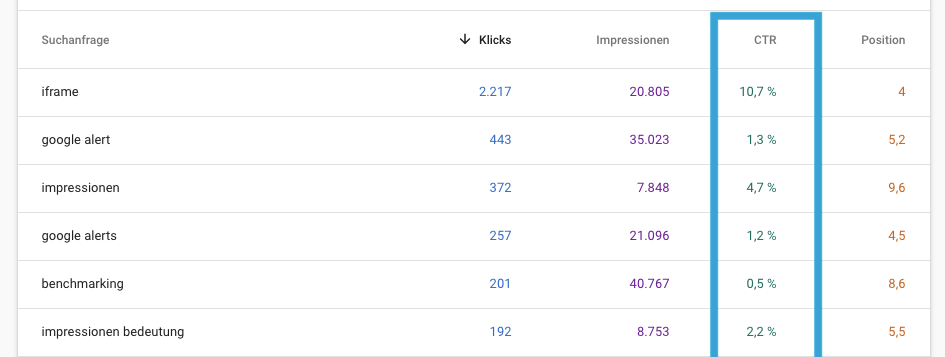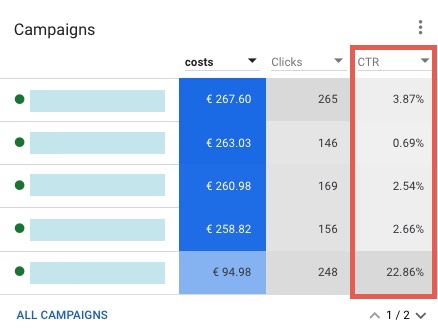The backend the data processing and storage running in the background. In contrast to the frontend, it is the invisible part of a website or software. What it is all about, you can find out here! ... Continue reading


The click-through rate (CTR) or click rate is an important metric that indicates how often an ad or link was clicked in relation to the number of impressions. It is crucial for the performance and success of advertising campaigns or search results.
The CTR is a crucial factor in various areas of online marketing. It gives you insights into how well your measures are received by the target group and shows how effective your content and campaigns are.
By optimising CTR in these different areas, you can not only increase visibility and click-through rates, but also improve the overall success of your marketing strategy.
You calculate the click-through rate by dividing the number of clicks on an impression by the total number of views of this ad.

If you now take the formula *100, you get the CTR in percentage.
Example: An ad that is displayed 1,000 times and clicked on 35 times has a click rate of 0.035 or 3.5%.
It is not possible to make a general statement about which click rate is good or bad. Click rates vary in different areas and must also be evaluated in a differentiated manner within a discipline. For example, the expected CTR of an advertising banner is completely different from that of a number 1 result of a SERP. The number 1 result will in turn differ significantly from a number 8 result in terms of click-through rate. Often the CTR alone is not even meaningful enough to be able to give an evaluation at all, because depending on the goal you need other metrics such as the conversion rate.
Nowadays, mobile optimisation is essential to increase the click-through rate (CTR). Since a large proportion of users access the internet via mobile devices, it is essential that websites work smoothly on smartphones and tablets. Slow loading times or difficult-to-use menus can quickly deter users and reduce the click-through rate. A website optimised for mobile devices not only improves the user experience, but also the ranking in search results, as Google favours mobile-friendly pages. To increase CTR, meta tags, images and call-to-action buttons should be specifically targeted to smaller screens and optimised for fast loading times. A positive mobile user experience means that visitors are more likely to click on your search result and stay on your website, significantly increasing the likelihood of a click.
When you talk about the click-through-rate in search engine optimization, you refer to the organic search result of a SERP as an impression. The CTR of your website for certain search queries in Google, you can see in the performance report of the Google Search Console.

The CTR is strongly dependent on how high the result is placed on the particular SERP. As a rule, the lower a result is placed, the lower the click-through rate. It should be noted that a result is only counted as an impression if it is also displayed. Since a result that is ranked 11th is displayed less often than one that is ranked 10th, it can still have a better click-through rate.
However, the CTR does not only depend on the placement on the SERP. You can also increase the click-through rate with an appealing snippet, or you can leave potential with a weak snippet. If the CTR of your page is too low, this can either be due to the fact that the snippets of other results are more inviting, or the page is not considered relevant for the search query by the users.

If you want to learn more about snippets and how to create them, read our detailed post on snippet optimization!
Although Google has denied that the CTR is an evaluation criterion for the ranking of the search engine, there are indications that the click-through rate has at least some influence on the placement of a search result. It is certain that Google measures the behavior of its users and uses this data to evaluate websites. However, the CTR is only one of many metrics. Since the click-through rate basically says nothing about the quality of a website’s content, but rather evaluates the snippet, there are other metrics which may be more suitable for measuring relevance such as bounce rate and dwell time.
The click-through rate in Google Ads shows the ratio of clicks on ads to impressions of those ads. It is an indicator to measure the success of ad campaigns. You can view the click-through rate for specific campaigns and keywords in Google Ads. To do this, click on the header of the column in which you want to display the click rate in the overview and select CTR. Alternative: You select an area via the page navigation. Google then lists many key figures for this area.

Google Ads uses CPC as a payment model, which means that every click on your ad costs you money. Therefore, you should not only pay attention to the click-through rate alone. It can happen that your ad is clicked often, but no conversions are generated. However, if conversions are the goal of the campaign, then you pay for the high click-through rate without achieving your goal.
A higher click-through rate also influences the price in another way. The costs per click are determined by the quality factor, among other things. A high click-through rate plays a favorable role in determining the quality factor. Thus, Google rewards a high click-through rate with a lower click price.
This depends heavily on the keyword and the ad format the ad is placed in. For text ads on generic keywords, CTRs of 3-5% are good. On brand keywords, CTRs of 30% and more are desirable, as you can usually easily satisfy the user’s motivation.
In online marketing, CTR is a crucial metric for measuring the effectiveness of marketing activities. A higher CTR indicates that the content presented, be it an ad, a search result or an email, attracts the attention of the target group and encourages them to click on the link. However, these clicks are not just numbers, but represent potential customers or users who actively interact with the content.
An improved CTR is not only an indicator of better visibility or relevance, but often also of deeper user engagement. It can lead to higher conversion rates because it represents direct interaction with the target group and ultimately the goal is for users not only to click but also to become active participants, subscribers or customers. Therefore, the focus is not only on achieving a high CTR, but also on improving the quality of traffic and subsequent user behaviour.
CTR also serves as a benchmark for measuring the effectiveness of various marketing strategies. Through continuous analysis and optimisation, marketers can find out which content or ads perform best and what adjustments are needed to further increase the interest and responses of the target audience. It is therefore essential to consider CTR as a key performance indicator in online marketing and to analyse it in the context of other metrics such as conversion rates and the quality of traffic.
You want to learn more about exciting topics?